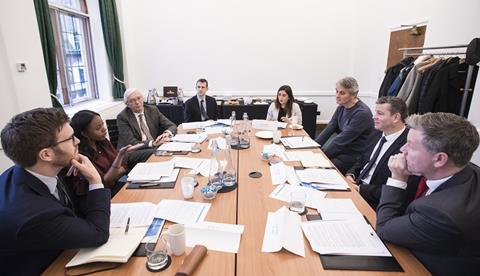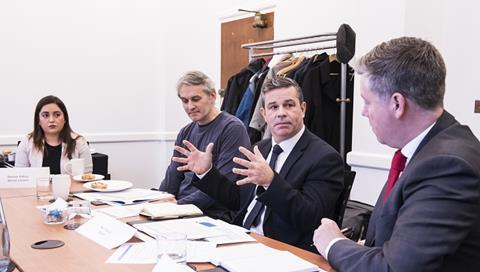Instead of focusing on how the planning system should be changed, GL Hearn’s latest annual planning survey explored how developers and planning authorities can work together to get the most out of the current system.
The aim was to identify key sticking points in the planning process and what practical steps can be taken to overcome them. The research identified some key areas such as the pre-application process and the post-determination phase where both developers and planning authorities agreed there was scope for improvement.
GL Hearn brought together a panel of experts to discuss the findings and share their own experience with the aim of developing a set of best practice guidelines.
Panellists - to discuss what are the keys to unlocking the benefits of the planning system?
- Kelly Harris, head of development planning, Notting Hill Genesis
- Colin Darby, planning manager, St Modwen
- Stuart Baillie, head of planning – London and South East, GL Hearn
- Chris Benham, planning director, GL Hearn
- Colin Wilson, head of regeneration, Old Kent Road, Southwark Council
- Neil Impiazzi, partnership development director, SEGRO
- Denisse Patten, senior planning officer, Barnet Council
- Guy Montague-Jones, deputy editor, PropertyWeek (chair)

All photos by Paul Burroughs
What improvements can be made at the pre-application stage?
Chris Benham: There are some really good examples of how local authorities work very well through the pre-application stage. The report picks up on some of the very best examples. It’s great to have Barnet Council here because it has a fantastic fast-track service. You pay a bit more and you get a meeting in a few days and a report a few days later. Others such as the London Legacy Development Corporation will give you full access to its planning committee early in the pre-app stage. That doesn’t guarantee you planning permission but it gives you an idea of where things are going to go before they reach a critical stage.
Denisse Patten: With the fast-track service, we’ve tried to make it as bespoke to the client as possible. We have different categories depending on the scope of the development and what the applicant is looking for. It’s proved really successful. It’s more collaborative. We get lots of compliments from developers.
Colin Darby: In addition to the fast-track and pre-application discussion with officers, it’s important to get members involved early. We can spend a long time talking professionally, but there’s a political climate for everything we do. I know it’s encouraged but its comparatively rare.
Neil Impiazzi: I’d agree with that. For the members, you want to tell a narrative and present a vision of what you’re trying to achieve. It’s important to get members in early to explain the benefits, whether that be building new homes for the local community or bringing in new investment to the area. Also, waiting for the statutory consultees can cause delays so if you get them involved early you can create a real determination to move forward. That way, as a developer you know what the challenges and opportunities are right from the outset.

CD: The other question is resource. It’s about capability and training. The issue is massively challenging and I’m not sure there’s any easy answer. But part of the answer is application fees and pre-app fees. Most people from our side are happy to fund that if there’s a decision in a certain timescale.
The survey found that developers agreed that pre-application discussions helped ensure appropriate content was submitted in applications, but did not necessarily speed up the planning process. Why is that?
NI: With the pre-application process, you get to a position where you know where you stand but you still have all the other problems such as resourcing and waiting for statutory consultees. You know where you are but you’re not able to proceed.
Is there support for more standardisation of the pre-app process and fees charged?
Colin Wilson: We’ve been looking at other people’s pre-app fees recently and they vary but not massively. Some people have slightly different ways of charging. Personally, I think whatever any authority is comfortable with, let them get on with it.
Stuart Baillie: We find the cost does still vary quite wildly. When you look at the same scale of application in one borough in London and another, you’d think it would be roughly the same, but there’s still quite a big fluctuation for the same level of input.
Kelly Harris: I don’t think standardisation would necessarily be a good thing. If you have a borough where there is a significant amount of development standardisation may work to its benefit, but in a borough where there isn’t much development it may not work as well. I think that so long as it’s transparent, applicants are generally happy to pay a significant fee. I think the onus is on the applicant, if they’re getting a quote of £14,000 for a pre-app, to press the planning authority and query that.
”I don’t think standardisation [of pre-apps] would necessarily be a good thing”
Kelly Harris, Notting Hill Genesis
CW: My own view is that along with the tea, coffee and biscuits you get at the meeting, you should expect to get some opinion and feedback. That’s the key. You are paying for something and you would expect officers to be there of the relative seniority to the proportions of the scheme to express a view.
CB: Some authorities like LLDC show you the hourly rates and assumed number of hours so it’s a transparent process, this is helpful and preferable.
Can technology help to improve the planning process?
NI: There is technology to share and work on documents together so you don’t have to get everyone in one room. Let’s be honest – a one hour meeting is three hours because of travelling time.
KH: But who pays for that? The pre-application fee only pays for so much and I know how strapped local authorities are.

CW: We’re heavily involved in DCLG’s digital innovation programme with Future City Catapult. The idea is to have a fast-track system in place to free up officer time by automating and digitising the planning applications system. The aim is to make it more customer friendly so it feels more like online shopping.
CB: Westminster has an automatic system that contacts applications once a fortnight to provide updates so you always know where you are in the consultation process. This helps to reduce the need to call offices as it provides links to consultation responses received. This could be improved further to give a clearer indication of what responses are received or outstanding but it’s a good start.
What improvements can be made late in the planning process?
SB: There’s still frustration with the time taken from planning determination through to actual start on site. That’s partly due to planning obligations taking a while to negotiate through the section 106 process and partly from condition discharging.
KH: I haven’t come across a scheme where we get a draft 106 agreement ready prior to committee, much to the chagrin of my superiors. Why aren’t they ready upfront so they can be part of the submission document? That would help improve engagement with the community as they want to know what benefits a scheme has.
CD: Committee and member training is another area to focus on. We’ve experienced two or three month slips in schemes because members haven’t quite understood the process or officers weren’t strong enough. Another point is the delegation of planning approvals away from planning committees. That might free up time to be spent on schemes that generate more homes and jobs.

DP: A lot of our committee time is taken up by the smaller schemes. Delegation would free up officers who have to write committee reports that have to be so robust. That is a drain on resources.
CB: Where would you raise the threshold to? Some authorities it’s two objections, others 10. Sometimes it’s the scale of development.
CW: All politics is local and sometimes it’s very local. I can remember going to a committee many years ago in Westminster and the Home Office development went through in half an hour and then the minicab office in Soho took the next three hours about its sign and flashing light. In the politics of Westminster, a massive office with no neighbours was approved straightaway whereas a small problematic thing with lots of noisy and articulate neighbours was a major issue. But I don’t think you’ll be able to say you can’t talk about that because politicians are our employers.
NI: From an industrial perspective, in our view, an infill development on an industrial estate shouldn’t be taking up planning committee time – that should be delegated. There are opportunities for commercial property infill schemes to be fast tracked.
How would you sum up the discussion?
SB: There’s agreement in a number of areas. There’s consensus that more can be front-loaded in the pre-application stage to speed up the planning process. There’s good support for innovation as well. Developers would be happy to pay more for pre-apps as long as it’s done transparently. Appropriate pre-app engagement with planning committees would provide greater confidence that a positive decision can be reached. Therefore working within the confines of the current planning system, there’s clearly plenty of scope to improve how the process works for all stakeholders.


































No comments yet